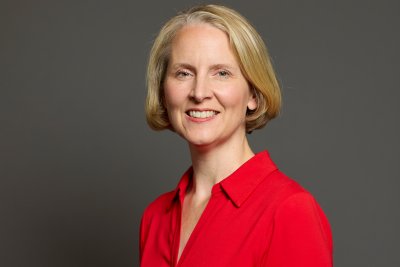 Credit: Sustain
Credit: Sustain
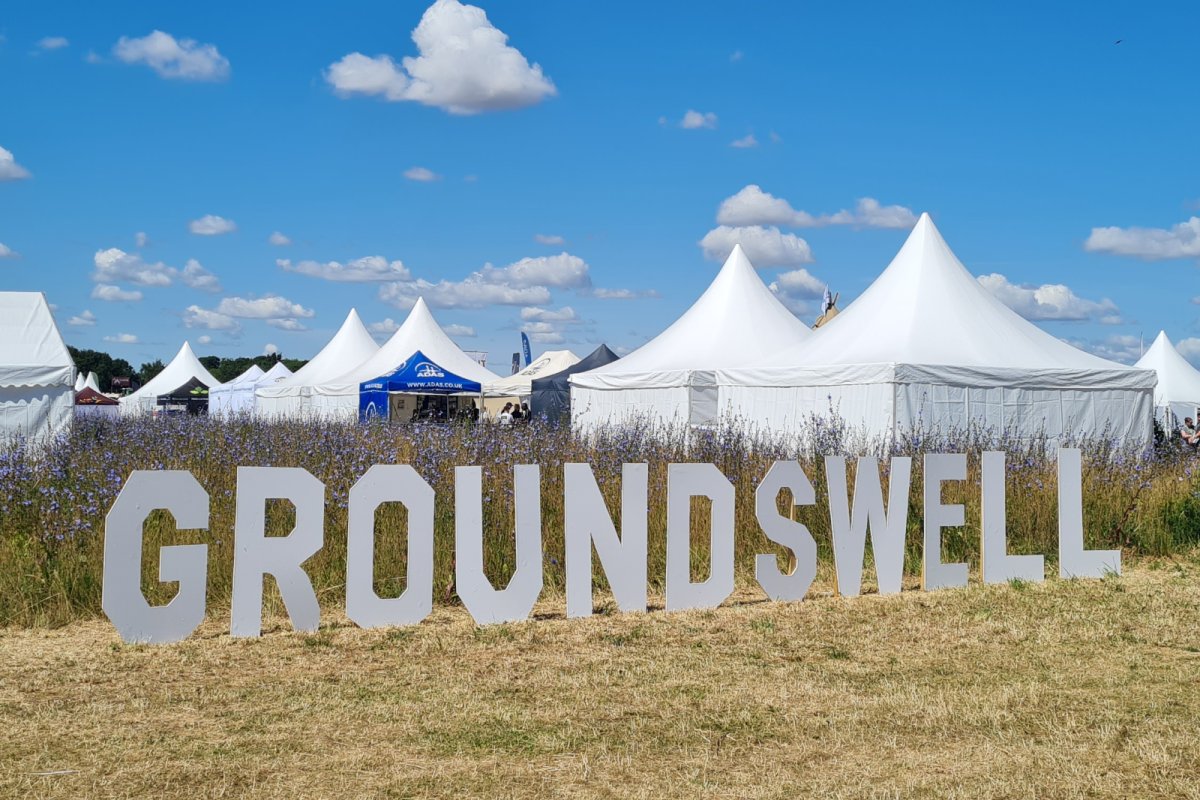
From fringe to mainstream: reflections on regenerative agriculture from Groundswell 2025
As regenerative agriculture steps into the mainstream, Groundswell 2025 offered a moment to pause, question, and reflect on what it really means - and what it will take - to farm with nature at scale.
Groundswell Festival 2025 was a reminder of how far the conversation around agroecological farming has progressed. With 10,000 attendees, a surprise ministerial appearance, and sessions covering everything from soil microbiology to public procurement, this year’s festival marked a turning point for the movement. For Sustain, the festival was an opportunity to listen, contribute, and reflect on what meaningful progress looks like.
What is regenerative agriculture, anyway?
If there was one question that echoed across Groundswell this year, it was: What does regenerative agriculture actually mean? It’s a deceptively simple question with no fixed answer.
Unlike organic certification, regenerative agriculture isn’t (yet) tied to a strict set of criteria. That flexibility allows it to be context-specific. Much like agroecology, it encourages farmers to think holistically about farming with nature. The word “regenerative” has inspired farmers to join a movement towards restoring nature and soils. They are proud to be part of a positive drive for change.
“Regenerative farming” is also perceived as an open term that can include farmers who have yet to fully transition to organic and agroecological methods. They may still be dependent on agri-chemicals, such as glyphosate. But that same openness risks being co-opted by corporate interests. Without agreed-upon standards, “regenerative” risks becoming another tool for greenwashing.
Scaling up without selling out
One of the dominant themes this year was how to scale regenerative agriculture. “Regen” is still relatively niche, and while it's growing, it’s bumping up against serious systemic barriers.
Chief among them is profitability. Many farmers want to do the right thing for the soil, climate, and future generations, but are boxed in by current extractive supply chains and economics that reward high yields over ecological outcomes. Andy Cato of WildFarmed put it bluntly: "our current food system pays for tonnes", not for ecosystem services like carbon sequestration or biodiversity. Until that changes, farmers will be stuck between their principles and their profit margins.
The language of change: supply networks, not chains
We can’t talk about regenerative farming without talking about who will buy it. In a packed-out session on supply chains, Hannah Gibbs, Coordinator of Sustain’s Bridging the Gap campaign, chaired a packed-out session on creating more routes to market for regenerative farmers.
Josiah Meldrum from Hodmedod’s raised an important point: we need to move away from industrial, purely transactional language like "supply chains" and instead talk about "supply networks" - webs of relationships rooted in trust and shared values.
As Julia Kirkby-Smith from Better Food Traders pointed out, the story of Bristol City Farm exemplifies this. Their success hinged on plugging into the Better Food Traders ecosystem. Oxford’s Farm to Fork initiative, where colleges procure directly from local farms, was also presented as a model of how procurement can be relational, values-led and economically viable.
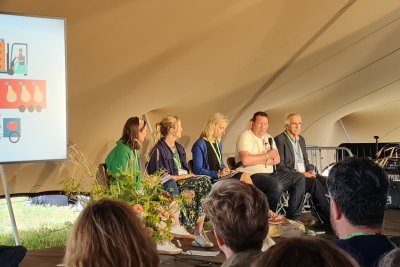
Patrick Holden, founder of the Sustainable Food Trust, identified three main barriers to scaling such networks. The first was finance, particularly for infrastructure like packing sheds and processing units. Secondly: demonstrating demand. He shared the story of schoolchildren lobbying their council to join the Welsh Veg in Schools scheme, after tasting carrots on his farm. This is just one illustration of how community-led advocacy can drive policy change.
The third barrier was culture: how we measure food’s value. Sustainably produced food has a premium price tag. Meanwhile, conventionally produced food is priced cheaply by large retailers, often below cost. The result is a monopolised food industry, and an expectation that food should be this cheap - not just among the public, but also among policymakers.
Making public procurement workable
Sustain’s Kiloran O’Leary spoke in a rich session on “making public procurement workable” for climate, public health and farmers. Several pilots in the Bridging the Gap programme, such as Welsh Veg in Schools, have demonstrated procurement can offer an income stream for farmers while feeding schools, hospitals and people with low incomes.
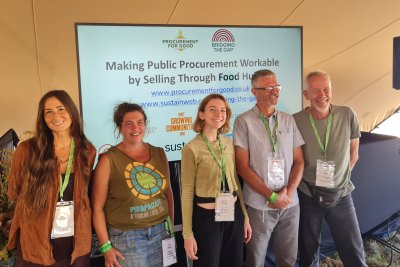
Zosia Walczak from Growing Communities spoke about another Bridging the Gap pilot in Hackney schools, which demonstrates it's possible to feed children healthy, sustainably produced food on budgets as low as £1 per meal. By bringing food preparation in-house, reducing reliance on expensive caterers, and increasing the use of vegetables over meat, schools saved money.
“Everyone should be able to access affordable, healthy, and sustainably produced food - and public sector procurement is one of the most powerful ways to achieve this.” Kiloran O’Leary, Sustain
Still, structural barriers remain. Many schools lack adequate kitchen space or storage. Many small growers can’t meet the large volumes needed for public sector contracts.
Public procurement can achieve multiple benefits: de-risking the transition for farmers, providing stable income for sustainable produce, and transforming school food. But to realise this, local authorities must join the dots between climate goals, health ambitions, and procurement policy. Too often, procurement teams operate independently of sustainability teams.
A year into Labour: where are we headed?
A major moment at Groundswell 2025 was the appearance of Steve Reed, Secretary of State for Environment, Food and Rural Affairs, as part of Sustain’s panel event on Labour’s first year in government. This was the first time a DEFRA minister has officially attended the festival, marking a milestone in regen ag’s journey from fringe to mainstream.
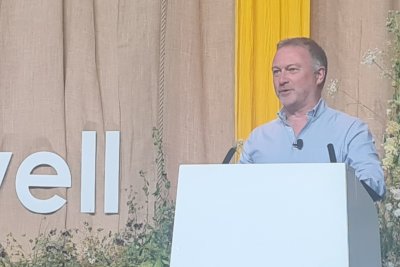
Steve Reed addressed a packed Big Top tent, praising regenerative farmers as “the pioneers of the agricultural transition.” He announced the reopening of capital grants and promised a revised SFI scheme, simplified and rooted in “public money for public goods.” He also acknowledged that farm profitability must go hand-in-hand with environmental outcomes.
Where is the vision for food and farming?
Despite good intentions, Harriet Bell from Riverford argued we’re still missing a clear national vision. Farmers want more than profit: they want to be part of a movement. The government must offer farmers a valued role in the nation’s future, to improve our soils, water, air, nature, climate and health.
Harriet also made clear that supply chain fairness is vital to support farming businesses - more so than chasing higher yields. Despite increases in agricultural productivity in recent decades, farming incomes have remained stagnant since the 1970s.
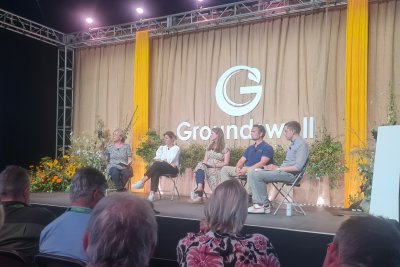
Trust was a major theme. The sudden closure of the SFI scheme to new applicants back in March has created a “trust deficit” among farmers. To rebuild confidence, ministers must be honest about budget constraints and strategic priorities.
Joe Stanley called on the sector to speak with "one voice" and engage constructively with policymakers. Sustain’s Kath Dalmeny echoed this, stressing the need for alliances. Farmers have applied knowledge in abundance - but rarely get a seat at the policy table. The government’s piecemeal “drip, drip, drip” approach risks slowing the pace of change.
What we take away
Groundswell 2025 was a moment of both reflection and clarity. Thousands of farmers, policymakers, scientists, and activists gathered not just to share knowledge, but to push for structural change.
The festival reaffirmed the central role of farmers and growers in tackling the climate, nature and health crises. It showcased the power of community-led procurement models, the challenges of certification and scale, and the urgency of making sustainable food a practical reality.
If one moment stuck, it came from Sue Pritchard of the Food, Farming & Countryside Commission. She relayed something she’d heard from a farmer:
"Climate change can't be real - because if it were, the government would ask us to do something about it."
It’s a reminder that farmers are ready to act - but they need leadership, clarity, and support. Regen ag can’t be left to farmers alone. It’s a whole-society project. That includes policymakers, consumers, and retailers.
Groundswell has become a flagship in the regenerative farming calendar and has helped gain momentum for the sustainable agriculture movement by securing the attention of those in power.
The challenge now? Turning momentum into lasting change - and making sure that, as regenerative agriculture grows, it remains true to its roots.
Sustainable Farming Campaign: Pushing for the integration of sustainable farming into local, regional and national government policies.
Sustain
The Green House
244-254 Cambridge Heath Road
London E2 9DA
020 3559 6777
sustain@sustainweb.org
Sustain advocates food and agriculture policies and practices that enhance the health and welfare of people and animals, improve the working and living environment, promote equity and enrich society and culture.
© Sustain 2026
Registered charity (no. 1018643)
Data privacy & cookies
Icons by Icons8
